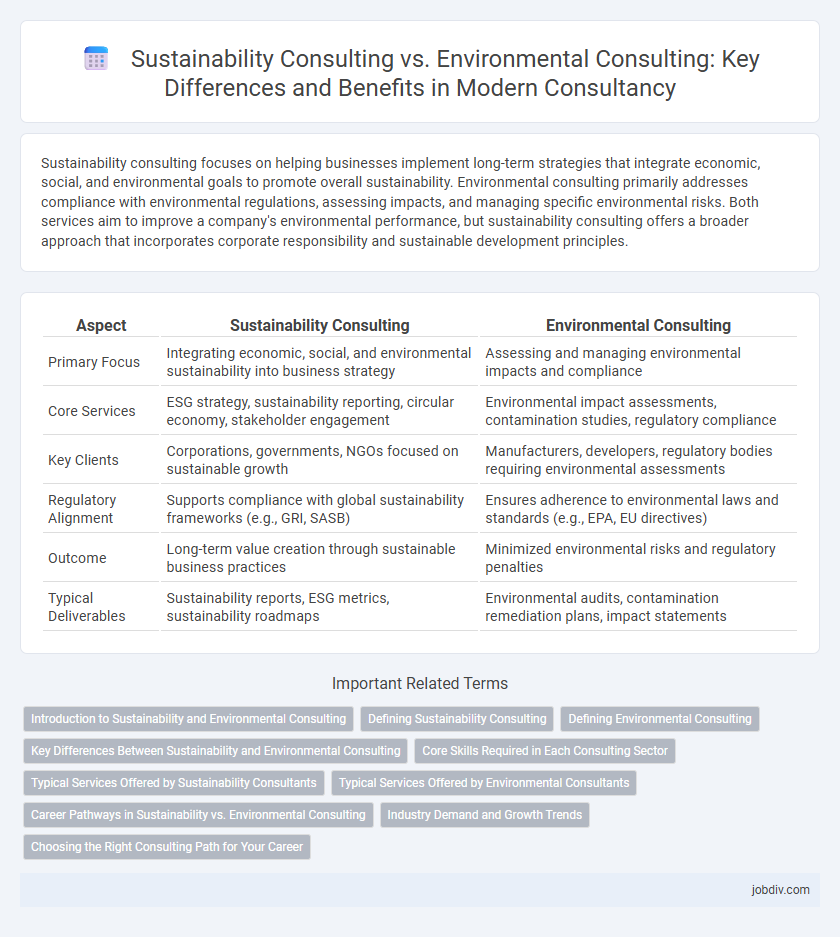Sustainability consulting focuses on helping businesses implement long-term strategies that integrate economic, social, and environmental goals to promote overall sustainability. Environmental consulting primarily addresses compliance with environmental regulations, assessing impacts, and managing specific environmental risks. Both services aim to improve a company's environmental performance, but sustainability consulting offers a broader approach that incorporates corporate responsibility and sustainable development principles.
Table of Comparison
| Aspect | Sustainability Consulting | Environmental Consulting |
|---|---|---|
| Primary Focus | Integrating economic, social, and environmental sustainability into business strategy | Assessing and managing environmental impacts and compliance |
| Core Services | ESG strategy, sustainability reporting, circular economy, stakeholder engagement | Environmental impact assessments, contamination studies, regulatory compliance |
| Key Clients | Corporations, governments, NGOs focused on sustainable growth | Manufacturers, developers, regulatory bodies requiring environmental assessments |
| Regulatory Alignment | Supports compliance with global sustainability frameworks (e.g., GRI, SASB) | Ensures adherence to environmental laws and standards (e.g., EPA, EU directives) |
| Outcome | Long-term value creation through sustainable business practices | Minimized environmental risks and regulatory penalties |
| Typical Deliverables | Sustainability reports, ESG metrics, sustainability roadmaps | Environmental audits, contamination remediation plans, impact statements |
Introduction to Sustainability and Environmental Consulting
Sustainability consulting focuses on integrating long-term environmental, social, and economic goals into business strategies to promote corporate responsibility and resilience. Environmental consulting primarily addresses compliance with environmental regulations, impact assessments, and pollution control to minimize ecological harm. Both services play crucial roles in guiding organizations toward sustainable development and environmental stewardship.
Defining Sustainability Consulting
Sustainability consulting focuses on integrating long-term environmental, social, and economic goals into business strategies, helping organizations achieve responsible growth and resilience. This consulting type guides clients in adopting sustainable practices, regulatory compliance, and reporting frameworks like ESG (Environmental, Social, and Governance). In contrast, environmental consulting primarily addresses compliance with environmental laws, impact assessments, and mitigation of ecological risks.
Defining Environmental Consulting
Environmental consulting involves assessing and managing the impact of human activities on natural ecosystems by conducting environmental assessments, compliance audits, and remediation planning. Unlike sustainability consulting, which integrates social, economic, and environmental goals for long-term organizational value, environmental consulting focuses specifically on regulatory adherence and minimizing ecological harm. Key services include site contamination analysis, environmental impact statements, and ensuring compliance with laws such as the Clean Air Act and the Resource Conservation and Recovery Act.
Key Differences Between Sustainability and Environmental Consulting
Sustainability consulting emphasizes long-term strategic integration of social, economic, and environmental goals within business operations, while environmental consulting focuses primarily on compliance with environmental regulations and mitigating ecological impact. Key differences include sustainability consulting's broader scope incorporating CSR initiatives and sustainable development goals, contrasting with environmental consulting's technical expertise in areas like pollution control and site remediation. Businesses seeking holistic, future-oriented guidance prioritize sustainability consulting, whereas those aiming to address immediate regulatory and environmental challenges opt for environmental consulting.
Core Skills Required in Each Consulting Sector
Sustainability consulting requires expertise in corporate social responsibility, lifecycle analysis, and stakeholder engagement to help businesses integrate sustainable practices into their operations and strategy. Environmental consulting demands strong skills in regulatory compliance, environmental impact assessments, and contamination remediation to address site-specific ecological challenges and legal requirements. Both sectors benefit from data analysis and project management, but sustainability consulting leans more towards strategic planning while environmental consulting emphasizes technical and scientific proficiency.
Typical Services Offered by Sustainability Consultants
Sustainability consulting typically encompasses services such as developing corporate social responsibility (CSR) strategies, conducting sustainability reporting aligned with GRI and SASB standards, and integrating circular economy principles into business operations. These consultants also perform life cycle assessments (LCA), carbon footprint analysis, and stakeholder engagement to drive long-term environmental and social value creation. Their expertise supports organizations in achieving ESG compliance, enhancing resource efficiency, and embedding sustainability into core business strategies.
Typical Services Offered by Environmental Consultants
Environmental consultants typically provide services such as environmental impact assessments, regulatory compliance audits, and site remediation planning, focusing on minimizing ecological damage and ensuring adherence to environmental laws. They conduct pollution control evaluations, habitat restoration projects, and sustainability reporting to help organizations meet environmental standards and improve their ecological footprint. These services differ from sustainability consulting, which often centers on broader strategic initiatives like corporate social responsibility and sustainable business practices.
Career Pathways in Sustainability vs. Environmental Consulting
Sustainability consulting careers focus on integrating long-term economic, social, and environmental goals within business strategies, often emphasizing corporate social responsibility, sustainable development, and ESG (Environmental, Social, and Governance) reporting. Environmental consulting careers typically concentrate on regulatory compliance, environmental impact assessments, pollution control, and site remediation, requiring expertise in environmental science, law, and engineering. Professionals in sustainability consulting may progress toward roles such as sustainability manager or ESG analyst, while environmental consultants often advance to environmental compliance specialists or site remediation project managers.
Industry Demand and Growth Trends
Sustainability consulting exhibits robust industry demand with a projected CAGR of 12% through 2028, driven by corporate commitments to ESG (Environmental, Social, and Governance) standards and circular economy models. Environmental consulting, while historically established, shows steady growth at around 6% CAGR due to stricter environmental regulations and increasing focus on climate risk management. Market analysis indicates sustainability consulting is rapidly expanding across sectors like manufacturing, finance, and technology, reflecting a broader shift toward integrated sustainable business strategies.
Choosing the Right Consulting Path for Your Career
Sustainability consulting focuses on integrating social, economic, and environmental strategies to help organizations achieve long-term value and corporate responsibility goals. Environmental consulting primarily addresses regulatory compliance, environmental impact assessments, and remediation projects related to natural resource management. Selecting between these paths depends on your passion for broader strategic sustainability initiatives versus specialized environmental science and regulatory expertise.
Sustainability Consulting vs Environmental Consulting Infographic

 jobdiv.com
jobdiv.com